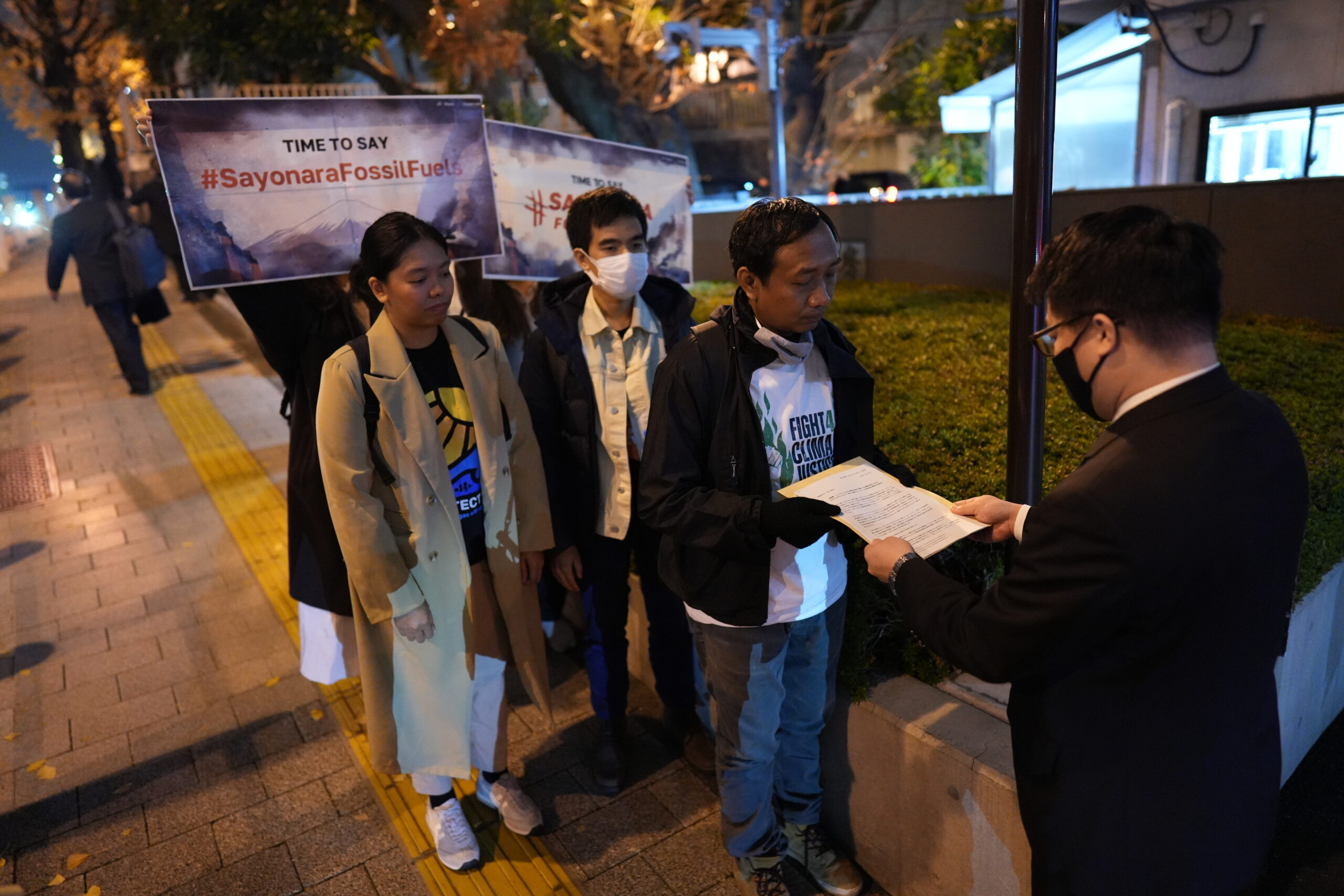[Press Release] Asia-Pacific Civil Society Groups Submit an Open Letter to Prime Minister Kishida Before the ASEAN-Japan Special Summit and Organized an Asia-wide Action: Japan should seize the "Golden Opportunity" to phase out fossil fuels

In conjunction with the ASEAN Japan Summit to be held in Tokyo on December 16-18, the Asia Zero Emission Community (AZEC) Summit will also be held in Tokyo, where leaders from Japan and other Asian countries will discuss cooperation toward decarbonization.
There is concern that Japan will promote the active use of gas and coal at these meetings, to be held under the slogan “Golden Friendship, Golden Opportunity," instead of phasing them out. Japan has been promoting investments and loans domestically and in other Asian countries that will prolong the life of fossil fuels, such as through fossil gas, hydrogen/ammonia/biomass co-firing, and carbon capture and storage (CCS).
On the 15th, the day before the ASEAN-Japan Summit, about 40 participants from Japanese and international environmental groups and members of the public gathered in Tokyo to demand that Japan end its support for fossil fuels and strengthen its support for renewable energy throughout the Asia-Pacific region. The action featured a giant mask of fossil fuel-dependant Prime Minister Kishida. Participants wore light bracelets resembling handcuffs to protest against Japan’s binding ASEAN countries to fossil fuels. The bracelets also represented wind and solar power, expressing participants’ hope for renewable energy.
On the same day, under the hashtag #SayonaraFossilFuels, which refers to Japan’s inability to part from fossil fuels, civil society groups are planning actions in 10 Asia-Pacific countries, including Japan (Japan, Philippines, Vietnam, Indonesia, Bangladesh, India, Pakistan, Canada, USA, Australia). The actions strongly oppose AZEC, which Prime Minister Kishida also promoted at the 28th Conference of the Parties (COP28) to the United Nations Framework Convention on Climate Change (UNFCCC). They also express opposition from overseas, including from ASEAN Countries, towards Japan’s fossil fuel support that is delaying decarbonization.
(Photos can be found here.)
On the same day, 89 civil society groups in Asia and beyond jointly submitted an open letter to Prime Minister Kishida (PDF version can be found here both in Japanese and in English). The letter expressed concern that Japan’s development of fossil fuel-based technologies will hinder the transition to renewable energy in Southeast Asia and prolong the use of fossil fuels. The letter also noted that Southeast Asia has abundant renewable energy resources, according to the International Renewable Energy Agency (IRENA) and the National Renewable Energy Laboratory (NREL), whose research is also cited by the Japanese government. The letter also warned that by promoting fossil fuel projects in Southeast Asia, Japan would expose communities already living in one of the world’s most vulnerable regions to further severe climate change impacts. For Southeast Asian electricity consumers, gas expansion would also be a major economic burden, as market prices would rise sharply in response to fluctuating gas prices, thus hindering access to stable and affordable electricity.
On the other hand, the letter asserted that instead of imposing fossil gas and fossil fuel-based technologies on Southeast Asia, Japan can show true friendship to ASEAN countries and real leadership in combating climate change by redirecting the US$10.6 billion it spends on fossil fuels each year to renewable energy. The letter urged Japan to use this “golden opportunity" to immediately end its investment in all fossil gas, hydrogen, ammonia, and biomass co-firing, CCS, and other false solutions and instead shift its support to renewable energy that meets the needs of communities and does not harm them.
Rere Christanto, Campaign Manager on Mining and Energy at WALHI:
There is already a lot of evidence of losses due to the use of fossil fuels in Indonesia. Hundreds of Thousands of people are reported to have died due to air pollution caused by coal-fired power plants, losses from this damage could reach USD 210 billion, 2 hectares of rainforest were cleared as coal mining areas, and hundreds of hectares of residential areas were submerged in mud due to gas drilling operations. We refuse to be a playground for Japan’s efforts to extend the use of fossil energy through the use of co-firing biomass, hydrogen, ammonia, CCS/CCUS, and LNG.
Find the petition (“Immediately Stop Prolonging the Life of Fossil Fuels and Destroying the Environment and Livelihoods in Indonesia – Meaningful Participation of Local Communities and Civil Society in Just and Equitable Energy Transition") here.
Lidy Nacpil, Coordinator, Asian People’s Movement on Debt and Development:
The Tokyo Summit provides an opportunity for Japan to start meeting their historical obligations to their citizens and to the Global South. However, their current energy strategy only benefits the corporate interests and not the people and communities of ASEAN. This kind of energy strategy only causes more harm and dangers from the impacts of and the uncertain future of the climate crisis.
Angelica Dacanay, Southeast Asia Just Energy Transition Lead, Center for Energy, Ecology and Development:
Japan’s commitment to assisting ASEAN in its journey towards decarbonization hides a reality: as the second-largest financier of fossil gas in Southeast Asia, Japan is steering the region toward a disastrous future. Its financial support extends to projects such as the Ilijan LNG import terminal, which is wreaking havoc on the marine ecosystem of the Verde Island Passage and adversely impacting the livelihoods of fisherfolks. To truly honor its commitment, Japan should redirect its efforts towards championing a transition to renewable energy in Southeast Asia.